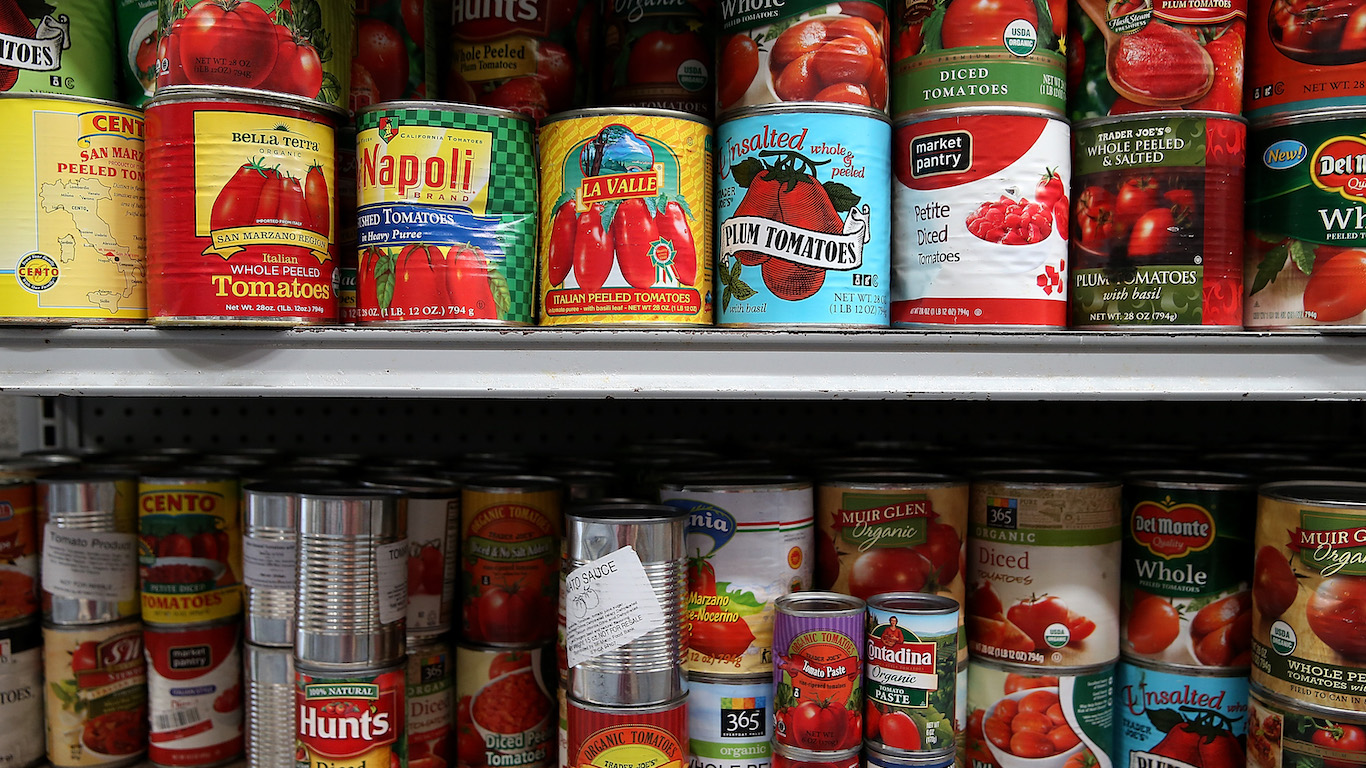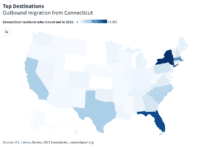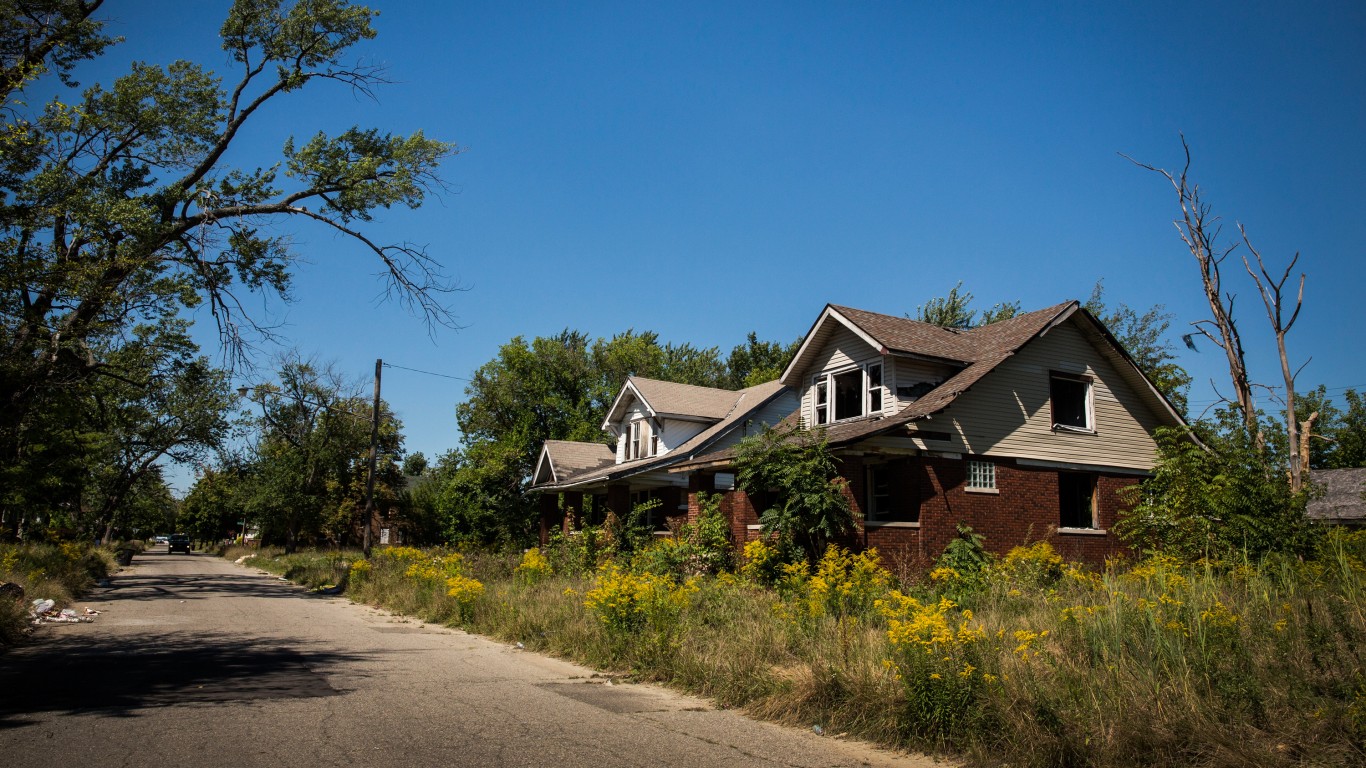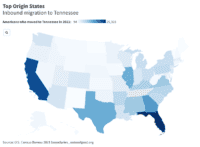
More than 38 million people, including nearly 12 million children, were food insecure in the United States in 2020, according to the U.S. Department of Agriculture. To put it another way, 11.5% of the U.S. population that year lacked consistent access to enough food for an active, healthy lifestyle.
While food insecurity doesn’t mean critical undernourishment that an estimated 161 million people suffer from worldwide, the fact that one in ten people in one of the wealthiest countries in the world lacks the financial resources to buy enough food is one of the most glaring examples of America’s growing income inequality. (These are states where income inequality has gotten worse since 2010.)
Food insecurity often correlates with a family’s lack of affordable housing, isolation in high-poverty areas, and few or no convenient access to affordable healthy foods. It exists in urban and rural communities alike and affects the elderly as well as young. Black and Hispanic families are disproportionately more likely to be poor and thus food insecure. According to the nonprofit group Feeding America, about 24% of Black Americans experienced food insecurity in 2020, while Black children are three times more likely than white children to live in a food-insecure household.
To determine the states with the worst food insecurity, 24/7 Wall St. reviewed The State of Childhood Obesity, a project from the Robert Wood Johnson Foundation. States were ranked based on the percentage of residents who were food insecure, meaning they “experienced limited or uncertain access to adequate healthy food at some point during the year.” Supplemental data came from the same report. (Obesity and food security sometimes go hand in hand; nearly 23% of obese Americans are said to be food-insecure. These are America’s most obese states.)
Click here to see states with the most food insecurity

50. North Dakota
> Food insecurity rate: 7.4%
> Children ages 2-4 using WIC: 15.4% (15th highest)
> Median household income: $64,577 (20th highest)
> Poverty rate: 10.6% (17th lowest)
[in-text-ad]

49. New Hampshire
> Food insecurity rate: 9%
> Children ages 2-4 using WIC: 17.2% (2nd highest)
> Median household income: $77,933 (8th highest)
> Poverty rate: 7.3% (the lowest)

48. Minnesota
> Food insecurity rate: 9.2%
> Children ages 2-4 using WIC: 12.5% (7th lowest – tied)
> Median household income: $74,593 (13th highest)
> Poverty rate: 9% (4th lowest)

47. Massachusetts
> Food insecurity rate: 9.6%
> Children ages 2-4 using WIC: 16.3% (6th highest – tied)
> Median household income: $85,843 (2nd highest)
> Poverty rate: 9.4% (8th lowest)
[in-text-ad-2]

46. New Jersey
> Food insecurity rate: 10.3%
> Children ages 2-4 using WIC: 14.9% (19th highest)
> Median household income: $85,751 (3rd highest)
> Poverty rate: 9.2% (5th lowest)

45. Wisconsin
> Food insecurity rate: 10.5%
> Children ages 2-4 using WIC: 14.4% (25th highest)
> Median household income: $64,168 (21st highest)
> Poverty rate: 10.4% (16th lowest)
[in-text-ad]

44. Virginia
> Food insecurity rate: 10.6%
> Children ages 2-4 using WIC: 15.8% (12th highest – tied)
> Median household income: $76,456 (10th highest)
> Poverty rate: 9.9% (10th lowest)

43. Illinois
> Food insecurity rate: 11%
> Children ages 2-4 using WIC: 15.2% (16th highest – tied)
> Median household income: $69,187 (17th highest)
> Poverty rate: 11.5% (25th lowest)

42. Maryland
> Food insecurity rate: 11.1%
> Children ages 2-4 using WIC: 16.4% (5th highest)
> Median household income: $86,738 (the highest)
> Poverty rate: 9% (3rd lowest)
[in-text-ad-2]

41. Colorado
> Food insecurity rate: 11.3%
> Children ages 2-4 using WIC: 8.6% (2nd lowest)
> Median household income: $77,127 (9th highest)
> Poverty rate: 9.3% (7th lowest)

40. Iowa
> Food insecurity rate: 11.5%
> Children ages 2-4 using WIC: 15.6% (14th highest)
> Median household income: $61,691 (21st lowest)
> Poverty rate: 11.2% (20th lowest)
[in-text-ad]

39. Connecticut
> Food insecurity rate: 11.6%
> Children ages 2-4 using WIC: 14.5% (24th highest)
> Median household income: $78,833 (6th highest)
> Poverty rate: 10% (12th lowest)

38. South Dakota
> Food insecurity rate: 11.7%
> Children ages 2-4 using WIC: 16% (10th highest)
> Median household income: $59,533 (18th lowest)
> Poverty rate: 11.9% (24th highest)

37. California
> Food insecurity rate: 11.7%
> Children ages 2-4 using WIC: 15.8% (12th highest – tied)
> Median household income: $80,440 (5th highest)
> Poverty rate: 11.8% (25th highest)
[in-text-ad-2]

36. Hawaii
> Food insecurity rate: 11.8%
> Children ages 2-4 using WIC: 13.6% (19th lowest – tied)
> Median household income: $83,102 (4th highest)
> Poverty rate: 9.3% (6th lowest)

34. Nebraska
> Food insecurity rate: 11.9%
> Children ages 2-4 using WIC: 14.7% (21st highest)
> Median household income: $63,229 (25th highest)
> Poverty rate: 9.9% (11th lowest)
[in-text-ad]

34. New York
> Food insecurity rate: 11.9%
> Children ages 2-4 using WIC: 14% (25th lowest)
> Median household income: $72,108 (14th highest)
> Poverty rate: 13% (17th highest)

32. Washington
> Food insecurity rate: 12%
> Children ages 2-4 using WIC: 13.8% (23rd lowest – tied)
> Median household income: $78,687 (7th highest)
> Poverty rate: 9.8% (9th lowest)

32. Delaware
> Food insecurity rate: 12%
> Children ages 2-4 using WIC: 16.3% (6th highest – tied)
> Median household income: $70,176 (16th highest)
> Poverty rate: 11.3% (22nd lowest)
[in-text-ad-2]

30. Vermont
> Food insecurity rate: 12.1%
> Children ages 2-4 using WIC: 12.9% (12th lowest)
> Median household income: $63,001 (25th lowest)
> Poverty rate: 10.2% (15th lowest)

30. Rhode Island
> Food insecurity rate: 12.1%
> Children ages 2-4 using WIC: 17.1% (3rd highest)
> Median household income: $71,169 (15th highest)
> Poverty rate: 10.8% (18th lowest)
[in-text-ad]

29. Montana
> Food insecurity rate: 12.3%
> Children ages 2-4 using WIC: 11.9% (5th lowest)
> Median household income: $57,153 (11th lowest)
> Poverty rate: 12.6% (20th highest)

27. Utah
> Food insecurity rate: 12.5%
> Children ages 2-4 using WIC: 8.5% (the lowest)
> Median household income: $75,780 (11th highest)
> Poverty rate: 8.9% (2nd lowest)

27. Pennsylvania
> Food insecurity rate: 12.5%
> Children ages 2-4 using WIC: 12.8% (11th lowest)
> Median household income: $63,463 (23rd highest)
> Poverty rate: 12% (22nd highest)
[in-text-ad-2]

26. Wyoming
> Food insecurity rate: 12.6%
> Children ages 2-4 using WIC: 10.6% (3rd lowest)
> Median household income: $65,003 (19th highest)
> Poverty rate: 10.1% (14th lowest)

25. Nevada
> Food insecurity rate: 12.7%
> Children ages 2-4 using WIC: 11.7% (4th lowest)
> Median household income: $63,276 (24th highest)
> Poverty rate: 12.5% (21st highest)
[in-text-ad]

23. Oregon
> Food insecurity rate: 12.9%
> Children ages 2-4 using WIC: 14.6% (22nd highest – tied)
> Median household income: $67,058 (18th highest)
> Poverty rate: 11.4% (23rd lowest)

23. Kansas
> Food insecurity rate: 12.9%
> Children ages 2-4 using WIC: 13.7% (21st lowest – tied)
> Median household income: $62,087 (24th lowest)
> Poverty rate: 11.4% (24th lowest)

22. Idaho
> Food insecurity rate: 13.2%
> Children ages 2-4 using WIC: 12% (6th lowest)
> Median household income: $60,999 (20th lowest)
> Poverty rate: 11.2% (21st lowest)
[in-text-ad-2]

21. Alaska
> Food insecurity rate: 13.4%
> Children ages 2-4 using WIC: 20.2% (the highest)
> Median household income: $75,463 (12th highest)
> Poverty rate: 10.1% (13th lowest)

20. Indiana
> Food insecurity rate: 13.7%
> Children ages 2-4 using WIC: 13.5% (18th lowest)
> Median household income: $57,603 (14th lowest)
> Poverty rate: 11.9% (23rd highest)
[in-text-ad]

19. Maine
> Food insecurity rate: 13.8%
> Children ages 2-4 using WIC: 14.6% (22nd highest – tied)
> Median household income: $58,924 (16th lowest)
> Poverty rate: 10.9% (19th lowest)

17. Florida
> Food insecurity rate: 13.9%
> Children ages 2-4 using WIC: 13.3% (17th lowest)
> Median household income: $59,227 (17th lowest)
> Poverty rate: 12.7% (19th highest)

17. South Carolina
> Food insecurity rate: 13.9%
> Children ages 2-4 using WIC: 12.7% (10th lowest)
> Median household income: $56,227 (10th lowest)
> Poverty rate: 13.8% (10th highest)
[in-text-ad-2]

16. Michigan
> Food insecurity rate: 14.2%
> Children ages 2-4 using WIC: 13.7% (21st lowest – tied)
> Median household income: $59,584 (19th lowest)
> Poverty rate: 13% (16th highest)

15. Tennessee
> Food insecurity rate: 14.5%
> Children ages 2-4 using WIC: 15.2% (16th highest – tied)
> Median household income: $56,071 (9th lowest)
> Poverty rate: 13.9% (9th highest)
[in-text-ad]

14. West Virginia
> Food insecurity rate: 14.6%
> Children ages 2-4 using WIC: 16.5% (4th highest)
> Median household income: $48,850 (2nd lowest)
> Poverty rate: 16% (6th highest)

13. Missouri
> Food insecurity rate: 14.7%
> Children ages 2-4 using WIC: 13% (13th lowest – tied)
> Median household income: $57,409 (13th lowest)
> Poverty rate: 12.9% (18th highest)

12. Arizona
> Food insecurity rate: 14.9%
> Children ages 2-4 using WIC: 12.5% (7th lowest – tied)
> Median household income: $62,055 (23rd lowest)
> Poverty rate: 13.5% (13th highest)
[in-text-ad-2]

10. Ohio
> Food insecurity rate: 15.1%
> Children ages 2-4 using WIC: 12.6% (9th lowest)
> Median household income: $58,642 (15th lowest)
> Poverty rate: 13.1% (15th highest)

10. Georgia
> Food insecurity rate: 15.1%
> Children ages 2-4 using WIC: 13.6% (19th lowest – tied)
> Median household income: $61,980 (22nd lowest)
> Poverty rate: 13.3% (14th highest)
[in-text-ad]

8. Texas
> Food insecurity rate: 15.4%
> Children ages 2-4 using WIC: 15.9% (11th highest)
> Median household income: $64,034 (22nd highest)
> Poverty rate: 13.6% (12th highest)

8. North Carolina
> Food insecurity rate: 15.4%
> Children ages 2-4 using WIC: 15% (18th highest)
> Median household income: $57,341 (12th lowest)
> Poverty rate: 13.6% (11th highest)

7. Kentucky
> Food insecurity rate: 15.5%
> Children ages 2-4 using WIC: 16.3% (6th highest – tied)
> Median household income: $52,295 (7th lowest)
> Poverty rate: 16.3% (4th highest)
[in-text-ad-2]

6. New Mexico
> Food insecurity rate: 15.8%
> Children ages 2-4 using WIC: 13% (13th lowest – tied)
> Median household income: $51,945 (6th lowest)
> Poverty rate: 18.2% (3rd highest)

5. Oklahoma
> Food insecurity rate: 16.2%
> Children ages 2-4 using WIC: 13.8% (23rd lowest – tied)
> Median household income: $54,449 (8th lowest)
> Poverty rate: 15.2% (8th highest)
[in-text-ad]

4. Alabama
> Food insecurity rate: 16.5%
> Children ages 2-4 using WIC: 16.2% (9th highest)
> Median household income: $51,734 (5th lowest)
> Poverty rate: 15.5% (7th highest)

3. Louisiana
> Food insecurity rate: 16.7%
> Children ages 2-4 using WIC: 13% (13th lowest – tied)
> Median household income: $51,073 (4th lowest)
> Poverty rate: 19% (2nd highest)

2. Arkansas
> Food insecurity rate: 17.2%
> Children ages 2-4 using WIC: 13.1% (16th lowest)
> Median household income: $48,952 (3rd lowest)
> Poverty rate: 16.2% (5th highest)
[in-text-ad-2]

1. Mississippi
> Food insecurity rate: 20.1%
> Children ages 2-4 using WIC: 14.8% (20th highest)
> Median household income: $45,792 (the lowest)
> Poverty rate: 19.6% (the highest)
Cash Back Credit Cards Have Never Been This Good
Credit card companies are at war, handing out free rewards and benefits to win the best customers. A good cash back card can be worth thousands of dollars a year in free money, not to mention other perks like travel, insurance, and access to fancy lounges. See our top picks for the best credit cards today. You won’t want to miss some of these offers.
Flywheel Publishing has partnered with CardRatings for our coverage of credit card products. Flywheel Publishing and CardRatings may receive a commission from card issuers.
Thank you for reading! Have some feedback for us?
Contact the 24/7 Wall St. editorial team.
 24/7 Wall St.
24/7 Wall St. 24/7 Wall St.
24/7 Wall St. 24/7 Wall St.
24/7 Wall St.

